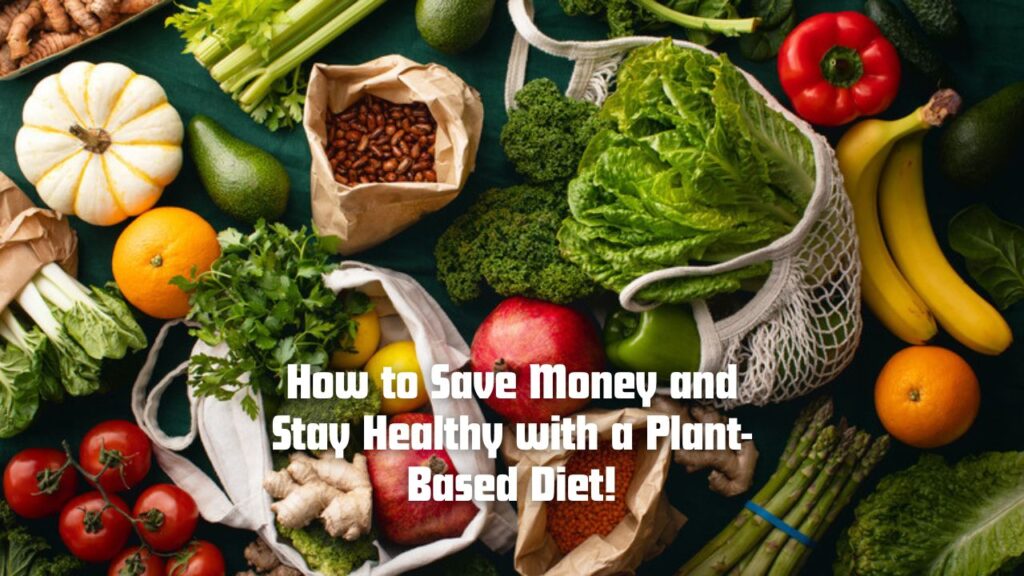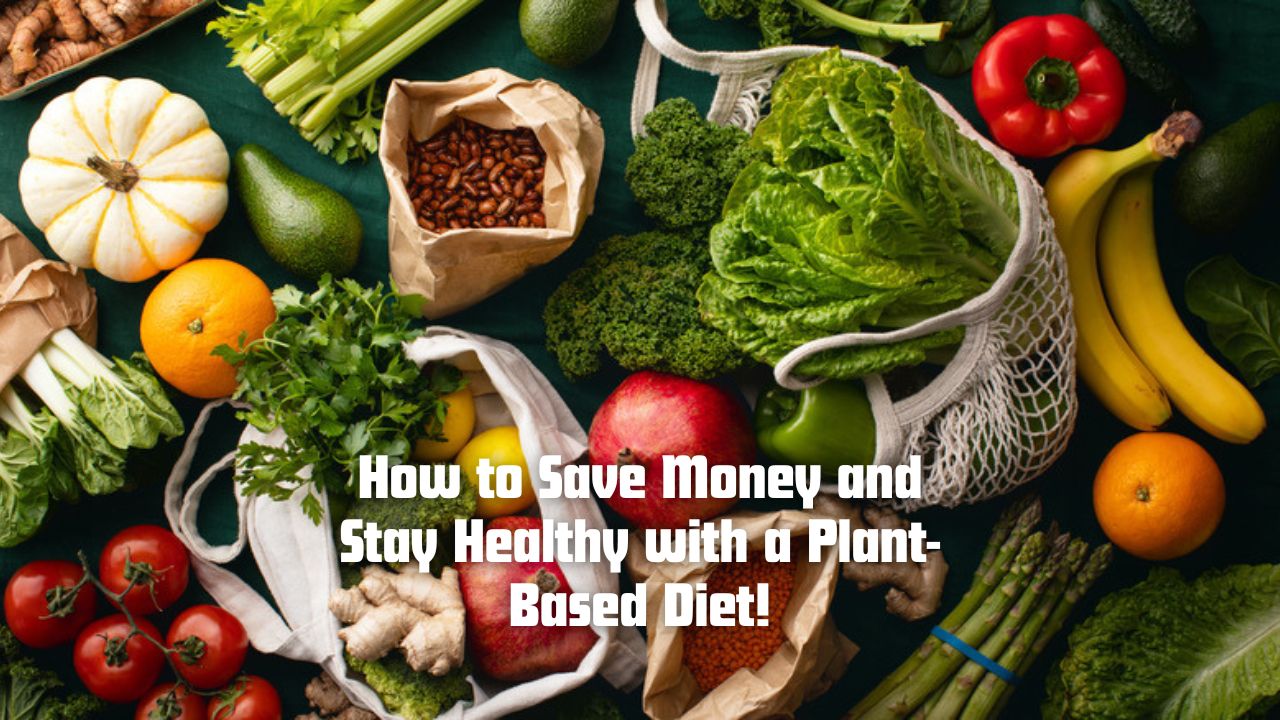How to Save Money and Stay Healthy with a Plant-Based Diet
Switching to a plant-based diet is one of the best ways to save money and improve your health. Many people think that eating healthy is expensive, but that is not true. A plant-based diet focuses on eating fruits, vegetables, grains, nuts, and seeds—all of which can be affordable and nutritious.
In this article, we will explore how you can reduce your grocery bills, cut medical costs, and even lower home and finance-related expenses by choosing plant-based foods. Let’s get started!
1. What is a Plant-Based Diet?
A plant-based diet means eating mostly or entirely foods from plants. This includes:
- Fruits and Vegetables
- Whole Grains (Rice, Oats, Quinoa, Barley)
- Legumes (Beans, Lentils, Chickpeas, Peas)
- Nuts and Seeds
- Plant-Based Oils (Olive Oil, Coconut Oil)
This diet avoids or limits animal products like meat, dairy, and eggs. Some people go fully vegan, while others just reduce animal products to save money and be healthier.
2. How a Plant-Based Diet Helps You Save Money
Lower Grocery Bills
Buying meat, fish, and dairy can be expensive. Plant-based foods like rice, beans, and vegetables are much cheaper and last longer. You can buy them in bulk and save more money.
Less Eating Out
Fast food and restaurant meals can cost hundreds of dollars each month. Cooking at home with simple plant-based recipes can cut food expenses in half.
Save on Healthcare Costs
A plant-based diet helps prevent diseases like diabetes, heart disease, and high blood pressure. This means fewer doctor visits, lower medical bills, and less need for expensive medications.
Cut Insurance Costs
Some health insurance providers give discounts for healthy lifestyles. A plant-based diet can help you get lower health insurance premiums.
3. Reduce Home and Finance Expenses with a Plant-Based Diet
Lower Utility Bills
Cooking plant-based meals uses less electricity and gas than cooking meat. Beans, lentils, and rice can be prepared in one pot, saving on energy bills.
Fewer Cleaning Costs
Meat and dairy can cause greasy stains and strong odors in your kitchen. Cleaning these requires expensive detergents. Plant-based foods leave fewer messes, so you save on cleaning products.
Save on Kitchen Equipment
Meat-based cooking needs grills, fryers, and expensive knives. A plant-based diet requires only basic pots, pans, and a blender, which saves money.
Improve Your Home’s Air Quality
Cooking with meat and dairy produces smoke and strong smells, which require air fresheners or air purifiers. Plant-based cooking produces less smoke, keeping your home cleaner and fresher.
4. Best Budget-Friendly Plant-Based Foods
1. Beans and Lentils
- Cost: Very cheap (buy in bulk)
- High in protein and fiber
- Long shelf life, making them a great investment
2. Rice and Whole Grains
- Cost: Affordable
- Good source of carbohydrates and energy
- Can be stored for months
3. Seasonal Fruits and Vegetables
- Cost: Low if bought in season
- Full of vitamins and minerals
- Can be frozen to last longer
4. Oats and Cereals
- Cost: Cheap and filling
- Great for breakfast and snacks
- No need for expensive milk or dairy products
5. Potatoes and Sweet Potatoes
- Cost: Budget-friendly
- Very versatile (can be baked, mashed, or fried)
- Packed with nutrients

5. How to Shop Smart for a Plant-Based Diet
Buy in Bulk
Buying rice, beans, and grains in bulk saves money. Look for wholesale stores or discount supermarkets.
Shop at Local Markets
Farmers’ markets and local grocery stores sell fresh vegetables at lower prices than big supermarkets.
Use Coupons and Discounts
Many stores offer discounts on plant-based products. Look for online coupons and store deals.
Avoid Processed Vegan Foods
Packaged vegan foods like fake meats and dairy alternatives are expensive. Instead, eat natural whole foods like beans, lentils, and grains.
6. Easy and Affordable Plant-Based Meals
1. Rice and Beans
- Cheap, easy, and full of protein
- Add spices for better taste
2. Oatmeal with Fruits
- Healthy and filling breakfast
- Use bananas, apples, or nuts for extra flavor
3. Vegetable Stir-Fry
- Use seasonal veggies
- Cook with olive oil and garlic for taste
4. Lentil Soup
- Warm, nutritious, and budget-friendly
- Can be stored for several days
5. Peanut Butter and Banana Sandwich
- Quick, cheap, and tasty
- Packed with energy and protein
7. Health Benefits of a Plant-Based Diet
1. Lower Risk of Heart Disease
Plant-based foods have less saturated fat, which keeps your heart healthy.
2. Better Digestion
High fiber in plant foods prevents constipation and improves gut health.
3. Weight Loss
A plant-based diet is low in calories and helps in losing weight naturally.
4. Stronger Immune System
Vitamins and minerals in fruits and vegetables keep your body strong and disease-free.
5. More Energy
Plant foods digest easily, giving you more energy throughout the day.
8. Common Myths About Plant-Based Diets
1. “It’s Too Expensive”
Truth: Beans, rice, and vegetables are cheaper than meat and last longer.
2. “You Won’t Get Enough Protein”
Truth: Beans, lentils, nuts, and seeds provide plenty of protein.
3. “It’s Hard to Cook Plant-Based Meals”
Truth: Simple recipes like rice and beans or stir-fried vegetables take less than 20 minutes.
4. “You Need Dairy for Calcium”
Truth: Leafy greens, nuts, and plant-based milks have more than enough calcium.
9. How a Plant-Based Diet Helps the Environment
1. Less Water Usage
Meat production uses thousands of gallons of water. Plants need much less.
2. Reduces Greenhouse Gases
Animal farming creates harmful gases that contribute to climate change.
3. Less Land Needed
Growing plants takes less land than raising animals.
4. Reduces Pollution
Meat production creates waste and pollution, while plant farming is cleaner.
10. Final Thoughts: Start Your Plant-Based Journey Today!
A plant-based diet is one of the best ways to save money, stay healthy, and improve your finances. It helps you reduce grocery bills, medical costs, and home expenses while keeping you fit and strong.
Start by adding more plant-based meals to your diet, shopping smart, and cooking at home. Your wallet, body, and the planet will thank you!
Would you try a plant-based diet to save money? Let us know!
10 FAQs: How to Save Money and Stay Healthy with a Plant-Based Diet
Here are the most common questions people ask about saving money and staying healthy on a plant-based diet:
1. Is a plant-based diet really cheaper than eating meat?
Yes! Meat, fish, and dairy are some of the most expensive grocery items. Buying beans, lentils, rice, and vegetables in bulk can cut your grocery bill in half. Plus, you save on medical bills by staying healthier.
2. How can I get enough protein without eating meat?
Many plant-based foods are high in protein, such as:
- Beans and lentils
- Chickpeas and tofu
- Quinoa and whole grains
- Nuts and seeds
These foods are cheaper than meat and still provide all the protein your body needs.
3. What are the best budget-friendly plant-based foods?
Some of the cheapest and healthiest plant-based foods include:
- Rice, oats, and whole grains
- Beans, lentils, and chickpeas
- Frozen and seasonal vegetables
- Potatoes and sweet potatoes
- Peanut butter and nuts
These foods are nutritious, filling, and affordable.
4. How can I save money when shopping for plant-based groceries?
- Buy in bulk (grains, beans, nuts)
- Shop at farmers’ markets for fresh, cheap produce
- Use store discounts and coupons
- Choose frozen vegetables (they last longer and cost less)
- Avoid processed vegan foods (like fake meat or dairy substitutes)
5. Can a plant-based diet help me save money on healthcare?
Absolutely! A plant-based diet helps prevent heart disease, diabetes, and obesity, which means:
- Fewer doctor visits
- Lower medical bills
- Reduced need for expensive medications
- Lower health insurance premiums (some providers offer discounts for healthy lifestyles)
6. What are the easiest and cheapest plant-based meals to make?
Some quick and budget-friendly plant-based meals include:
- Rice and beans
- Oatmeal with fruit
- Vegetable stir-fry
- Lentil soup
- Peanut butter and banana sandwich
These meals take less than 20 minutes to cook and cost just a few dollars per serving.
7. Is eating out expensive on a plant-based diet?
It can be, but you can save money by:
- Choosing simple plant-based options like salads, rice bowls, or veggie wraps
- Ordering side dishes instead of full meals
- Cooking at home instead of eating out
Making meals at home is always cheaper than restaurant food!
8. Can a plant-based diet help reduce my home expenses?
Yes! Here’s how:
- Lower electricity and gas bills (plant-based meals cook faster)
- Fewer kitchen cleaning products (less greasy mess from meat)
- Less money spent on kitchen gadgets (no need for expensive grills or fryers)
9. What are some common mistakes people make when switching to a plant-based diet?
- Buying too many expensive vegan products (stick to whole foods)
- Not eating enough protein and fiber (include beans, lentils, and nuts)
- Not planning meals (meal planning helps save money and time)
10. Can I still build muscle on a plant-based diet?
Yes! Many plant-based athletes build muscle using:
- Lentils, beans, and chickpeas
- Tofu, tempeh, and edamame
- Quinoa and whole grains
- Nuts, seeds, and peanut butter
These foods are rich in protein and healthy fats, perfect for fitness and strength!
